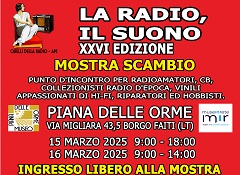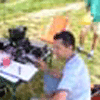Entry Level License Class for Germany
Sep 9, 2022 - HF, News, Youth General - Philipp, DK6SP

Press Release by Deutscher Amateur Radio Club (DARC e.V.)
+ DARC e.V. — Department of Education, Youth and Further Education (AJW)
Baunatal, Germany — 07.09.2022
Today, the Federal Ministry of Digital Affairs and Transport presented the draft bill of a new amateur radio regulation, which will bring some innovations for all radio amateurs. The chairman of the DARC e. V. and the Round Table Amateur Radio (RTA), Christian Entsfellner, DL3MBG was pleased: “The new regulation implements long-standing demands of the DARC and the Round Table Amateur Radio. In the future, remote operation will finally be allowed. Likewise, the ministry has implemented our demand for an entry-level class, which has existed since 2008.
This will significantly simplify the entry into amateur radio.” While the existing classes E and A will be raised in level by bringing in new topics from digital technology, class N will focus on operational knowledge, regulations and basic knowledge of the technology. Holders of the new Class N will be allowed to transmit on 2m and 70cm with a maximum power of 10 W EIRP. “In accordance with international specifications, the new entry-level class is intended to offer young people and older people in particular access to amateur radio” explains board member Ronny Jerke, DG2RON. The legally specified self-building right is not limited thereby, thus also a newbie can develop radios or Hotspots themselves, develop and take in enterprise.
The examination will follow a building up system, as it is known e.g. from the US-American amateur radio examination. Here, the exam for class N is taken first, which already contains all questions from the areas of operational knowledge and regulations. Then the technical examination for Class E and then Class A can be taken.
“The examination catalogs developed by the DARC for the three classes are structured in such a way that the contents and questions are not repeated, i.e. contents that have already been tested in a lower class no longer play a role in the examination for a higher class. All future radio amateurs pass the examinations of the class N, over E up to the class A. It should be possible to take all exams in one day,” says Education, Youth and Further Education (AJW) head of department Dr. Matthias Jung, DL9MJ.
Remote operation, which was previously not regulated, has been included in the new amateur radio regulations. In the future, holders of Class A licenses will be allowed to operate amateur radio stations remotely and also to allow other Class A radio amateurs to use them. Another important change concerns educational radio operation, which will be possible in the future without a separate educational call sign. Instead, by prefixing the prefix “DN/”, any Class E or Class A callsign becomes a training callsign.
The RTA now has 4 weeks to comment on the draft regulation. The DARC board and units have already begun a detailed review of the ordinance text and will report back in a timely manner.
The press release of the Federal Ministry of Digital Affairs and Transport can be read at bmdv.bund.de/SharedDocs/DE/Pressemitteilungen/2022/065-kluckert-amateurfunkverordnung.html.
Attached to the press release is a draft of the second ordinance on the amendment of the amateur radio ordinance. This can be found as a PDF file at bmdv.bund.de/SharedDocs/DE/Gesetze-20/zweite-verordnung-aenderung-amateurfunkverordnung.html.
(Original Press Release translated from German into English language by DK6SP)

Press Release by Deutscher Amateur Radio Club (DARC e.V.)
+ DARC e.V. — Department of Education, Youth and Further Education (AJW)
Baunatal, Germany — 07.09.2022
Today, the Federal Ministry of Digital Affairs and Transport presented the draft bill of a new amateur radio regulation, which will bring some innovations for all radio amateurs. The chairman of the DARC e. V. and the Round Table Amateur Radio (RTA), Christian Entsfellner, DL3MBG was pleased: “The new regulation implements long-standing demands of the DARC and the Round Table Amateur Radio. In the future, remote operation will finally be allowed. Likewise, the ministry has implemented our demand for an entry-level class, which has existed since 2008.
This will significantly simplify the entry into amateur radio.” While the existing classes E and A will be raised in level by bringing in new topics from digital technology, class N will focus on operational knowledge, regulations and basic knowledge of the technology. Holders of the new Class N will be allowed to transmit on 2m and 70cm with a maximum power of 10 W EIRP. “In accordance with international specifications, the new entry-level class is intended to offer young people and older people in particular access to amateur radio” explains board member Ronny Jerke, DG2RON. The legally specified self-building right is not limited thereby, thus also a newbie can develop radios or Hotspots themselves, develop and take in enterprise.
The examination will follow a building up system, as it is known e.g. from the US-American amateur radio examination. Here, the exam for class N is taken first, which already contains all questions from the areas of operational knowledge and regulations. Then the technical examination for Class E and then Class A can be taken.
“The examination catalogs developed by the DARC for the three classes are structured in such a way that the contents and questions are not repeated, i.e. contents that have already been tested in a lower class no longer play a role in the examination for a higher class. All future radio amateurs pass the examinations of the class N, over E up to the class A. It should be possible to take all exams in one day,” says Education, Youth and Further Education (AJW) head of department Dr. Matthias Jung, DL9MJ.
Remote operation, which was previously not regulated, has been included in the new amateur radio regulations. In the future, holders of Class A licenses will be allowed to operate amateur radio stations remotely and also to allow other Class A radio amateurs to use them. Another important change concerns educational radio operation, which will be possible in the future without a separate educational call sign. Instead, by prefixing the prefix “DN/”, any Class E or Class A callsign becomes a training callsign.
The RTA now has 4 weeks to comment on the draft regulation. The DARC board and units have already begun a detailed review of the ordinance text and will report back in a timely manner.
The press release of the Federal Ministry of Digital Affairs and Transport can be read at bmdv.bund.de/SharedDocs/DE/Pressemitteilungen/2022/065-kluckert-amateurfunkverordnung.html.
Attached to the press release is a draft of the second ordinance on the amendment of the amateur radio ordinance. This can be found as a PDF file at bmdv.bund.de/SharedDocs/DE/Gesetze-20/zweite-verordnung-aenderung-amateurfunkverordnung.html.
(Original Press Release translated from German into English language by DK6SP)



 . . . . . . . . . . .
. . . . . . . . . . . 







